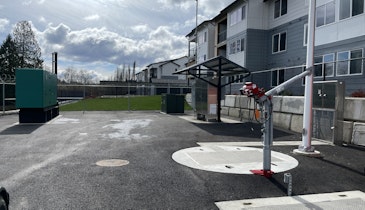In mid-September the 6th U.S. Circuit Court of Appeals ruled against Geomatrix LLC in its antitrust lawsuit with the wastewater standards organization NSF International. A federal trial judge in Port Huron, Michigan, had dismissed the lawsuit. Geomatrix appealed, and a three-judge panel of the appeals court said the dismissal was justified.
In its original 2020 lawsuit, Geomatrix claimed there was a conspiracy at NSF to create doubt about its GeoMat leaching system, and it said this conspiracy led to a reduced market for its product. In addition to NSF, Geomatrix sued BioMicrobics, of Lenexa, Kansas, Hoot Systems LLC, of Lake Charles, Louisiana, and an employee of BioMicrobics who led an NSF subcommittee considering a new standard for high-strength wastewater.
Geomatrix, said the appeals court opinion obtained NSF Standard 40 certification for its GeoMat product in July 2014. In September 2017, Geomatrix asserted, an NSF paper presented to the NSF committee on wastewater technology suggested that products like GeoMat, which treat and disperse water in the same place, should be placed under a new standard yet to be developed. Since that paper was presented, products like GeoMat were disparaged at NSF meetings, Geomatrix asserted in its suit.
The appeals court decision noted that at least 37 states have adopted NSF Standard 40 in their regulations, and other states rely on the standard in making decisions. But because the proposed NSF separate standard has not been formulated, Geomatrix suffered no harm, wrote the appeals court. In addition, the appeals court said Geomatrix did not renew its NSF certification for GeoMat, which made any action by NSF irrelevant. And the appeals judges agreed with the trial judge who said that under the First Amendment right to free speech, people or companies may ask for special consideration in rules and laws. Any problems that Geomatrix had in selling its product resulted from the independent decisions of state regulators, not from the actions of NSF, the appeals court said.
EPA opens civil rights investigation in Alabama
In October the U.S. Environmental Protection Agency opened a civil rights investigation to determine whether the state discriminated against Black residents when it handed out billions of dollars in federal infrastructure funding.
The investigation grows out of a complaint filed this spring by environmental justice activists who claim that policies adopted by the Alabama Department of Environmental Management make it nearly impossible for Black residents to access money in the state’s Clean Water Revolving Fund. Hundreds of homes in the state’s Black Belt — named for its rich black soil — don’t have functioning septic tanks, news reports said.
In a statement, Aaron Colangelo, chief litigation counsel for the Natural Resources Defense Council, said, “Alabama disburses tens of millions of dollars every year through the state revolving fund, but they have never awarded a single dollar of that money to people with onsite sanitation needs. We know they can do better.” The NRDC is one of the parties that filed the complaint.
ADEM said in a statement that it disagrees with the complaint, and it said federal audits have consistently found the department to be in compliance with rules. ADEM has until Nov. 2 to send a written response to the EPA.
This spring, after an 18-month investigation, the U.S. Justice Department reached an agreement with the state over environmental discrimination in Lowndes County. The state agreed to stop imposing fines, penalties and threats of liens on people who couldn’t afford functioning onsite systems. The state also promised to collect data and develop a long-term sanitation plan.
FEMA assistance available for weather-damaged onsite systems
Californians whose wells or onsite systems were damaged by severe weather this year may be eligible for assistance under a program of the Federal Emergency Management Agency.
Damage must have occurred between Feb. 21, 2023, and July 10, 2023, and must have been caused by severe storms, straight-line winds, floods, landslides or mudslides, according to news reports. FEMA may provide assistance or reimbursement for the cost of a professional repair estimate, and FEMA may provide assistance for repairs or replacements not typically covered by home insurance.
Counties included in this program are: Butte, Kern, Madera, Mariposa, Mendocino, Mono, Monterey, Nevada, San Benito, San Bernardino, San Luis Obispo, Santa Cruz, Tulare and Tuolumne.
To request a FEMA inspection, or to follow up on an inspection already done, call the FEMA helpline 800-621-3362. Calls are answered between 4 a.m. and 10 p.m. Pacific Time.
Wastewater permits go online in Clackmas County, Oregon
As of Oct. 4, onsite professionals gained the ability to handle wastewater permits online in Clackmas County, Oregon. The Development Direct portal — already used for building, electrical, plumbing and other permits — can now handle wastewater permits, reports and other business. Project status is available in real time, and the website can collect fees and provide copies of approved plans and post-construction forms, according to a news release from the county.
For more information, the county Septic and Onsite Wastewater Program can be reached at 503-742-4740 or by email at soilsconcern@clackamas.us.
Vermont announces onsite system repair funding
The Vermont Agency of Natural Resources has announced a $5 million third round of funding to help low- and moderate-income homeowners with repairs or replacements of onsite systems.
Eligible homeowners must apply for this funding round by Oct. 31, according to a press release from the office of Gov. Phil Scott.
The agency will select about 200 projects to receive money based on household income and demographics, environmental impact and the severity of the system failure. Selections are expected by the spring of 2024, and recipients must complete their projects and spend funds by September 2026.
To be eligible, people must own and live on a residential property with either a single-family home or a multi-family home with no more than four units; have a failed or inadequate onsite wastewater system; and have an annual household income of less than $80,835.
The first round of funding came in 2021, and the agency is allocating $10 million from the first and second funding rounds. Almost 90% of the households selected for that funding have an annual income less than $50,000.
New onsite system requirements in Martha’s Vineyard aim to address nitrogen
The Tisbury Board of Health on Martha’s Vineyard in Massachusetts expanded the requirement for installation of advanced nitrogen-removing wastewater systems.
The new rules, which take effect Jan. 1, apply only to properties in the Lagoon Pond and Lake Tashmoo watersheds, reported the Vineyard Gazette. These rules require advanced systems when an existing septic system is upgraded, repaired or replaced.
Previous rules required advanced treatment only for new construction, for replacement of a failed system, for increased use of a property, or when the health board deemed it necessary if a property changed ownership.
Scott Horsley, a water resources biologist who consulted for the town, said the new rules will help the community meet the state’s tighter nitrogen limits for sensitive areas.
System conversion program in Nevada gets a boost
A $5 million grant from the Nevada Department of Conservation and Natural Resources will boost the septic system conversion program of the Southern Nevada Water Authority.
Funding is for the voluntary conversion program the authority created this year, according to the Las Vegas Sun. Septic system owners can receive assistance to connect to municipal sewer systems.
Bronson Mack, spokesperson for the water authority, said annual connection fees will likely be between $200 and $250. Property owners interested in switching from septic to sewer must contribute 15% of the total cost. The conversion program covers the other 85%, up to $40,000.






